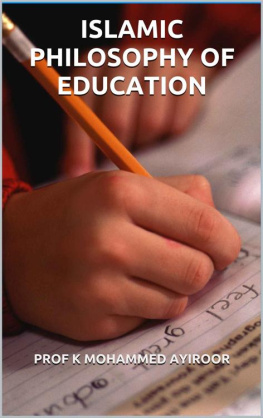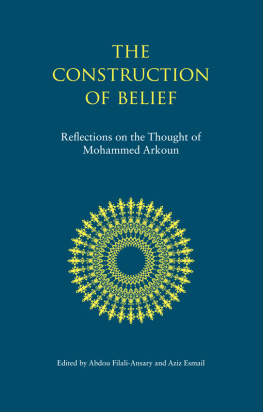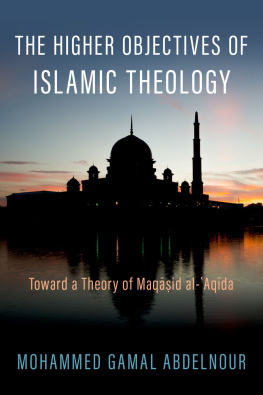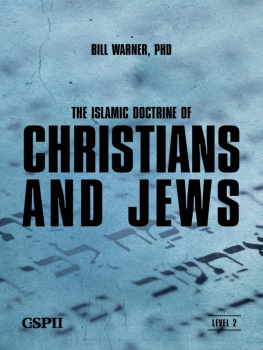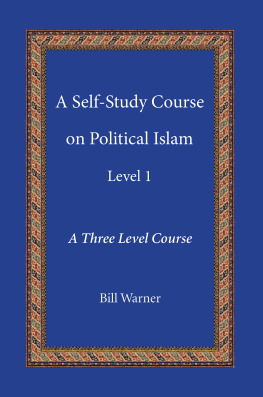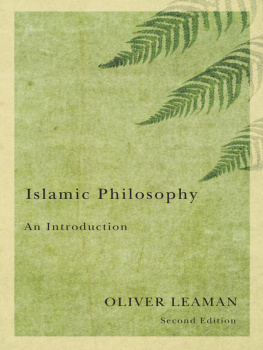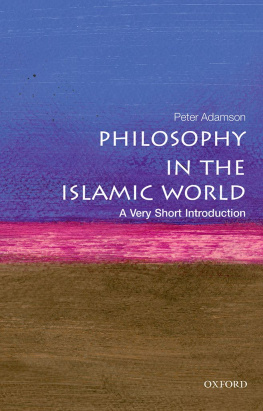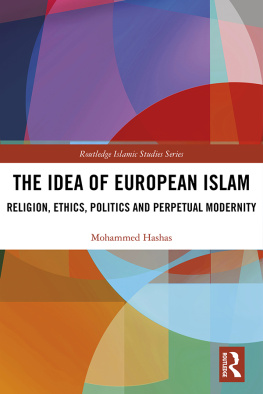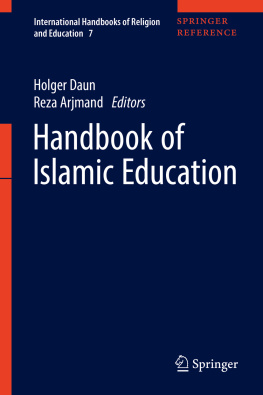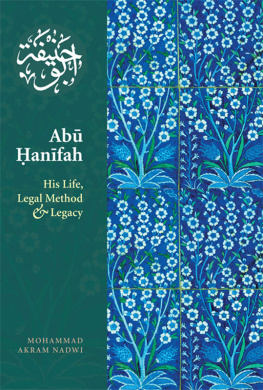Prof K Mohammed Ayiroor - Islamic Philosophy of Education
Here you can read online Prof K Mohammed Ayiroor - Islamic Philosophy of Education full text of the book (entire story) in english for free. Download pdf and epub, get meaning, cover and reviews about this ebook. year: 2019, genre: Religion. Description of the work, (preface) as well as reviews are available. Best literature library LitArk.com created for fans of good reading and offers a wide selection of genres:
Romance novel
Science fiction
Adventure
Detective
Science
History
Home and family
Prose
Art
Politics
Computer
Non-fiction
Religion
Business
Children
Humor
Choose a favorite category and find really read worthwhile books. Enjoy immersion in the world of imagination, feel the emotions of the characters or learn something new for yourself, make an fascinating discovery.
- Book:Islamic Philosophy of Education
- Author:
- Genre:
- Year:2019
- Rating:4 / 5
- Favourites:Add to favourites
- Your mark:
- 80
- 1
- 2
- 3
- 4
- 5
Islamic Philosophy of Education: summary, description and annotation
We offer to read an annotation, description, summary or preface (depends on what the author of the book "Islamic Philosophy of Education" wrote himself). If you haven't found the necessary information about the book — write in the comments, we will try to find it.
Islamic Philosophy of Education — read online for free the complete book (whole text) full work
Below is the text of the book, divided by pages. System saving the place of the last page read, allows you to conveniently read the book "Islamic Philosophy of Education" online for free, without having to search again every time where you left off. Put a bookmark, and you can go to the page where you finished reading at any time.
Font size:
Interval:
Bookmark:
ISLAMIC PHILOSOPHY OF EDUCATION
By Prof: K Mohammed Ayirur
Dedication
May the Lord Almighty accept this as a pious offering and reward for this my much honoured parents, Makkalikkal Kunjahammad and Kuvvakkattayil Thithayi, who brought me up with much vigil, sense of purpose and great psychological foresight, though they were too unfortunate to complete formal education!
Ameen
Preface
When I was doing my MEd in the Department of Education at the University of Calicut, I came to know, in the course of conversations with my Philosophy Professor Dr. Kelu, that though the syllabus included Islamic philosophy, it had not been taught seriously or the questions from the area had not been listed for exams. He held out to me a book saying that it was the only book available in that regard. Reading it, I understood that the book was centered on the educational activities and reforms in the Mughal era. I set that book aside and went to the library to explore more. There I chanced upon Educational Ideas of Abul Kalam Azad by one Rasul Abdu. On the basis of that book, I prepared a paper titled Educational Aims and Ideals Exemplified in the Quran drawing on references from the English translation of Abul Kalam Azad's Tarjumanul Quran . I submitted the paper to Dr. Kelu who commended me and asked to present it in the classroom. Discussions post the presentation made me realise the relevance and worth of this book.
Though I longed for a research on this area, I was not fortunate enough to avail myself of a guide who was willing to take this up. The issue resurfaced when I was employed at the curriculum department of the State Council for Educational Research and Training (SCERT), of the Kerala Government. When we discussed in some depth about the objective of Education and the Waywardness of the modern young generation, I became more earnestly conscious of the conspicuous lack of a book with a prick of conscience about the negligence of my own duty. The nagging pain of this conscience persisted while I took part in activities for the formation of KCF 2007 and chaired group discussions convened to pinpoint the objectives of education. Everyone was grief-stricken over the degeneration of modern young generation. However none appeared to trace its causes and thrash out ways to solve it, rather than airing knee-jerk reactions that did not reflect the problems at hand. Witnessing this painful state of affairs, I decided it was time I tried to fulfil my mission and duty. And my earnest desire for fulfilling my mission of preparing a primer on Islamic Philosophy of Education made this book possible.
The book is divided into two parts. The first part gives an analytical overview of concepts such as Idealism, pragmatism, realism, naturalism and existentialism-concepts that are playing extremely important roles in the process of modern education and are being widely and earnestly debated by the community of students and teachers. I hope therefore that students enrolled for academic educational courses such as B.Ed, TTC and DLEd will hugely benefit from this. The second part deals with Islamic philosophy of Education, the crux of this book. I hope that this part will make it reference book besides being a source book on comparative studies for MEd students.
I am grateful to many respected persons who helped me make it possible. Dr M Abdul Salam, the former Vice Chancellor of Calicut University tweaked his busy daily schedule to write a foreword for the Malayalam edition of the book. Mr. PP Abdul Rahman inspired me as well as teachers at Ansar Training College. Vicharam Books made the book a reality by elegantly producing its Malayalam edition. I benefitted much from the extended hands of Saidu Muhammad (Thalikkulam College), T.P. Ahmed (Syndicate Member of Calicut University and the Ansari Charitable Trust. There are many friends and well-wishers, I offer my gratitude to all of them.
I hope this book will pave the way for thoughts and reflections heading to new directions. This is merely an attempt, to be taken to its due denouement by competent persons. I submit this to readers with much hope and prayer. May God accept this as a humble offering and make it beneficial to society as a whole.
Prof. K. Muhammad Ayiroor .
Malappuram,
Kerala, India
mohamed.ayrur@gmail.com
Introduction
This book Islamic Philosophy of Education has been authored by Prof. K. Mohammed in intention that it will be a guide for teachers educationists etc. The first part of the book explains the Educational philosophies like Idealism, pragmatism, naturalism, realism and existentialism which are actively discussed in modern educational processes. The Axiology, Epistemology, Metaphysics and Methodology of teaching etc. also discussed in this part. These are all again discussed in detail in the second part based on Islamic Philosophy. Importance, significance, and influence of these theories in the modern educational process are also discussed in detail. It can see that the important ideas related to the psychology of education, sociology of education, methodology etc. also have been included in this book. There is no doubt that this book will be a reference and great help to the teachers, teacher students and serve as a guide for the educationists.
The aim of our education system is to create and nourish a good citizen who is acceptable to the nation and the society. But when analyzing the contemporary incidents we are not in a state of peace that we have achieved this aim of education. The increase of moral degradation and decline of morality create panic. The educational philosophy has a big role to play in ascertaining the aim of education and forming activities needed for its fulfillment. Therefore search for philosophies which are capable of shaping a value embedded citizen becomes significant. The author has made a step in that direction through this book.
Education has a crucial role in the social reforms. Education is a lifelong process from womb to the tomb. Different individuals, powers, theories and ideologies are influencing everyone in his life time. Through education the skill must be developed to recognize the gained knowledge and experiences to accept and reject the good and bad accordingly. Absence of this matter is the actual cause for the crisis which we are facing. The author points out that Islamic philosophy is helpful for achieving this recognition and capability.
The Islamic philosophy has a clear and broad vision towards education. We cannot find any other philosophy which has given this much of importance to education. It is a historical truth that it was the Quran and life of prophet Mohamed which forms the basic sources of Islamic philosophy that revived the Arabs from darkness of ignorance and made them models for the world, rulers and philosophers. The active situation formed from this influence gave birth to the excellent scholars like Ibn sina, Alberuni etc. Knowledge explosion were created in various fields like astronomy, medicine, chemistry, astrology etc. The author has tried to highlight these matters too. The book also refers to the similarities and dissimilarities between Islamic philosophy and other philosophies. Even though books on other Educational philosophies are available, absence of a book on the Islamic educational philosophy makes it significant.
These kind of books need deep research and a lot of hard work to be put into it. The experience of serving as a teacher trainer has helped the author to make this book a unique. It is understood that the long service of prof. K. Mohamed in SCERT in curriculum formation, teacher training, development of various textbooks, and formation of various tools for evaluation etc. also helped him in this great efforts. It is a true that deep research, comprehensive vision and sincere commitment are the qualities which create a good teacher. It is seen that the important features of a teacher has been explained in detail in this book. I extend my best wishes for this work to become an encouragement to bring about a change in the education process in a way it will make possible for the creation of a good society which stands firm in truth, ethics and morality. I wish all the very best.
Next pageFont size:
Interval:
Bookmark:
Similar books «Islamic Philosophy of Education»
Look at similar books to Islamic Philosophy of Education. We have selected literature similar in name and meaning in the hope of providing readers with more options to find new, interesting, not yet read works.
Discussion, reviews of the book Islamic Philosophy of Education and just readers' own opinions. Leave your comments, write what you think about the work, its meaning or the main characters. Specify what exactly you liked and what you didn't like, and why you think so.

